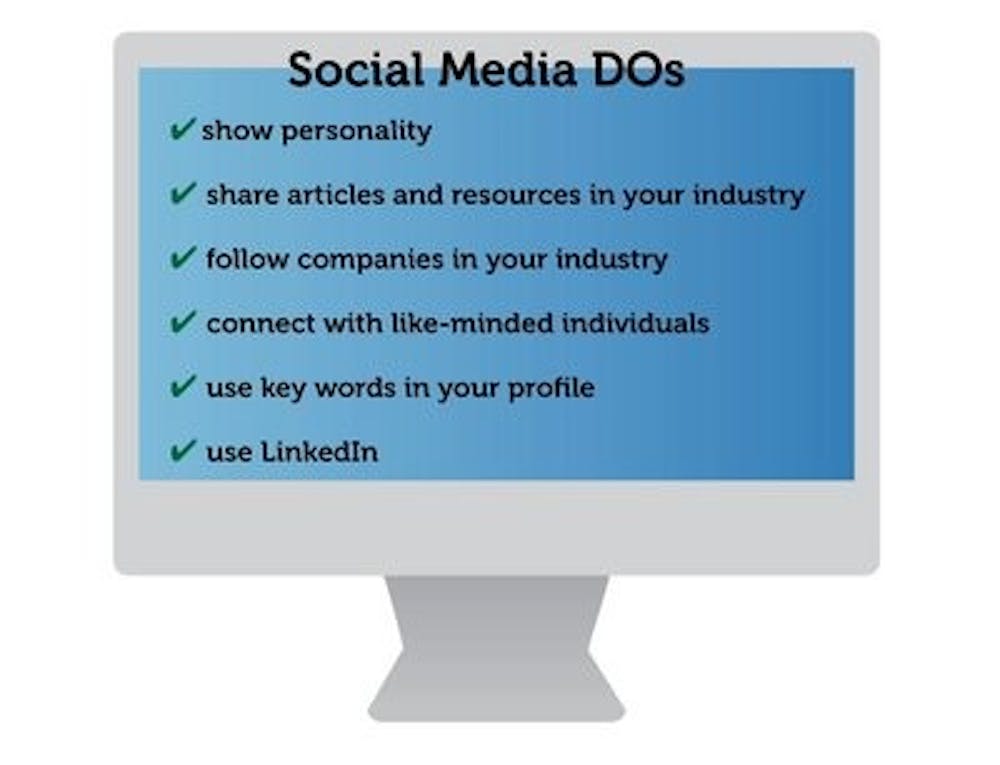We live in a world where public and private lives have become closely linked, due in part to the meteoric rise in use of social media. While participation in social media is a rite of passage and an expected behavior in, it's important to realize there are repercussions in living such a public life-especially when considering jobs.
Addye Buckley-Burnell, assistant director of career development at the Auburn University Career Center, said accessibility of information online has brought about the need for students to censor what they put online.
"It's too easy to Google you now," Buckley-Burnell said. "Your online image and your online brand have become increasingly important with the age of technology. If you can control what's out there, that certainly helps."
According to Kristen Jacoway, a career design coach and Auburn alumna, Microsoft conducted a study that reported 79 percent of employers search for job candidates online. Such staggering statistics, both Jacoway and Buckley-Burnell said, should prompt students to be constantly aware of what they put online.
"Know your audience," Buckley-Burnell said. "It could lead to you being fired or you not being hired on. Depending on your industry, you need to be more careful about some things than others. It can be hard to navigate sometimes."
A huge problem that Buckley-Burnell and Jacoway pointed out was posting negatively about any former employer or job.
"These are surefire ways not to gain the respect of an employer," Jacoway said. "We've seen where that's cost people job opportunities. I tell people that you have to make sure what you put out there, you'd be OK with it showing up on the news or on the front page of a newspaper."
It's important to censor yourself, but a fine line exists on this side as well. Showing only professional posts can seem boring or forced, And having no presence at all-while seemingly safe-presents an even greater problem. Skirting the issue is not a solution.
On Twitter, Jacoway and Buckley-Burnell suggest following companies and experts in your field, and to share articles and resources pertaining to your industry to followers.
Jacoway said it's about "Really just positioning yourself to seem like someone that's an expert in your field," and to show that you know information that "Lends to your industry, thought leadership and expertise."
Jacoway said your online presence should not be devoid of all personal detail, and bits of your personality should always be balanced in.
"You don't want people to go to your Twitter page and think you're a robot, shooting out a bunch of resources and articles," Jacoway said. "Show a little mix there, show your personality, of course. People want to see people's personalities."
While making information private might seem like a good defense mechanism against prying company eyes, Buckley-Burnell said that's only a starting point, and to carefully consider what it looks like to not have an online presence.
"Realize that if everything online about you is set to private, it can actually work against you in some ways," Buckley-Burnell said. "If an employer searches for you and they don't find you on Facebook or Twitter, they're going to start questioning it. Not being there can almost be as bad as being there. It's a fine line."
Jacoway agrees, and said to be careful of loopholes if you decide to go all-private.
"You've got to consider they would not necessarily have access to the information, but if they are friends with somebody that's friends with you, there could be some overlap," Jacoway said.
They recommended setting up a Google Alert for your name by going to google.com/alerts. Any time your name is published on the Web, you get a notification email with the link to make sure it's something you'd want a potential employer to see.
Another exercise to assess your online presence is to simply Google your first and last name in quotation marks. According to Jacoway, most employers will not go past the third page when Googling an applicant, so she suggests at least looking at your first three to get an accurate picture of your online presentation.
Jacoway urges students to consider using Facebook for only personal purposes, and to make sure to have everything set to private for everyone other than friends.
Twitter is an excellent place to establish a middle ground between your personal and professional life.
"(It's) a great place to forge connections, many opportunities that have come my way have come from the Twitter platform," Jacoway said. "You just have to be careful what you tweet, (and) balance it with something personal."
For purely professional purposes, Jacoway suggests using LinkedIn.
"LinkedIn is one I encourage people to get on because a survey found that 93 percent of employers (use it) to source talent," Jacoway said.
Jacoway said that not all hope is lost if you've racked up a tally of social media behavior that could be negatively construed, or what she referred to as "digital dirt."
There are a number of ways to remedy your past maladies. Jacoway recommends coming up with good content, especially by blogging, to "Try to push the (bad) results down off of page three" of Google. If you put the content up yourself, take it down and hope it hasn't been spread or seen. If someone else has inappropriate content of you up, ask them to take it down. Websites like reputation.com can intercede on your behalf if they refuse to take it down.
There may be a stigma of negativity toward social media and the working world, but Buckley-Burnell insists that it's not all bad, but ultimately about getting to know applicants better.
"They want to see how you're going to fit into their work culture. It's looked at to see if you're a well-rounded person," Buckley-Burnell said.
Do you like this story? The Plainsman doesn't accept money from tuition or student fees, and we don't charge a subscription fee. But you can donate to support The Plainsman.




